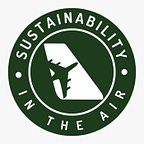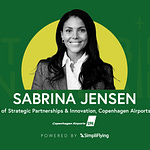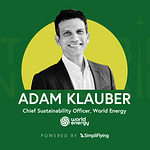In this episode of our ‘Sustainability in the Air’ podcast, Andrea Carroll, Group Head of Sustainability at daa, speaks with SimpliFlying CEO Shashank Nigam. She shares how the airport group is fostering a climate-positive culture that promotes sustainability as a shared responsibility, introducing innovative training methods, and actively engaging with both internal and external stakeholders.
daa group are the commercial semi-state operators of Dublin and Cork airports; airport retail operators (ARI), and management consulting (daai). As daa has grown to have a presence in about 15 countries, it has shed its previous name: “Dublin Airport Authority”. Its current operations extend beyond Ireland’s two largest airports – Dublin and Cork – to the Middle East, Canada, APAC, and Europe. Their business model is diverse, and they even have investments in airports in Cyprus and Düsseldorf.
Here are the key highlights of the conversation:
Introduction to daa (3:33)
Sustainability objectives for daa and Dublin Airport (7:07)
Planning for sustainable infrastructure and dealing with Scope 3 emissions (10:04)
Three driving principles (16:36)
Enabling cultural change and climate literacy in a complex organisation (19:42)
Sustainability Ambassadors programme (22:05)
Balancing growth and sustainability (27:57)
Preparing for the future (35:52)
Dealing with climate activists (38:50)
Rapid fire! (44:08)
Keep reading for a quick overview of the episode.
Why a climate-positive culture matters
daa’s sustainability goals include becoming a net-zero business by 2050. One of their major short-term targets is to reduce Dublin Airport’s energy usage by 51% by 2030 (vs. 2018 levels). Carroll is clear, however, that there is no magic wand to get to their goals. In fact, their best bet is to focus on steady incremental changes while ensuring that an understanding, appreciation and championing of environmentalism seeps through the organisation and becomes an immutable part of its DNA.
To imbibe a climate-positive culture within the organisation, daa focuses on empowering its employees and promoting climate awareness. Some noteworthy initiatives include:
Training and upskilling resources: In order for businesses to adopt sustainable practices, sustainability must be a consideration at every stage of their operations, and not just at the final steps. This can only be made possible if the people involved in each phase are equipped with the necessary knowledge to recognise and implement climate-friendly and efficient processes. daa offers its employees online training modules in an engaging, gamified format to bring about a shift in their perspectives. This, Carroll believes, ensures that sustainability takes the centre stage in every activity and remains at the top of everyone’s agenda.
The Sustainable Ambassadors programme: Under the ‘Sustainable Ambassadors’ programme, daa also supports its employees to pursue initiatives that further their sustainability agenda. This encourages an efficient bottom-up approach that integrates sustainability into the employees’ roles, explains Carroll. So far, over 100 passionate employees have volunteered to lead initiatives such as transitioning heavy vehicles, like fire engines, to Hydrotreated Vegetable Oil (HVO) – slashing their carbon emissions by ~90%!
5 ways daa is ushering in a more sustainable future
1. Three core principles
Three principles are guiding daa’s approach to sustainability: decarbonisation, circularity, and enhancing local environments.
In their decarbonisation efforts, daa is integrating a solar panel farm to reduce their reliance on fossil fuels. Additionally, the airport group is not solely fixated on new technologies but is keen on enhancing the efficiency and prolonging the lifespan of their current infrastructure, including boilers.
The principle of circularity in their operations underscores the reduction of waste, notably highlighted in their initiatives to segregate waste at security checkpoints. For example, there was a significant boost in recycling rates at these security lanes, catapulting from a mere 10% to an impressive 70-80%.
Beyond these initiatives, there’s a recognition of the profound impact airports have on local environments, spanning from noise pollution to biodiversity implications. To address these concerns, a proactive engagement with local communities has been deemed indispensable to both understand and alleviate these environmental effects.
2. Balancing growth and sustainability
Carroll acknowledges the challenge of balancing growth with sustainability. Drawing from her prior experience working with data centres (at Amazon Web Services), she observes a notable tension between rapid growth trajectories and sustainability commitments. Such tensions, she explains, aren’t unique to one sector but are prevalent across industries.
For countries like Ireland, with its expanding population, the role of airports extends beyond mere travel hubs. Airports serve as vital connectors for families spread across regions and as crucial nodes in trade networks. Emphasising the socio-economic role of Dublin Airport, Carroll mentions a compelling statistic – the airport facilitates or supports approximately 116,000 jobs, making it crucial to Ireland’s economy.
The discussion also mentions Amsterdam’s Schiphol Airport, known for its growth restrictions due to environmental and other concerns. While some might compare Schiphol and Dublin due to their importance to their countries, Andrea pointed out a key difference: Schiphol mainly acts as an international hub, whereas Dublin primarily meets Ireland’s national needs.
“We absolutely have to continue to try to reach our sustainability targets while maintaining the growth that we need. We have a passenger cap right now of about 32 million and we are looking at what growth might look like within the next decade or so.”
3. Preparing for the future
Carroll emphasises the complexities of addressing scope three emissions (such as those caused by airlines), which currently account for around 92% of daa’s total emissions, yet remain outside their direct control. That said, daa is actively engaging with stakeholders, including airlines and ground handlers, to encourage sustainable decisions.
Carroll also mentions the challenges associated with transitioning daa’s vehicular fleet to more sustainable fuel sources. Heavy vehicles are integral to airport operations, and are currently diesel-powered. To address this, daa has adopted the use of Hydro-treated Vegetable Oil (HVO) – a form of biodiesel derived from vegetables, which can be sourced from waste or pure biofuel – as a transitional fuel.
By the end of the year, they anticipate that 60% of their heavy vehicle fleet at Dublin Airport will operate on HVO, aiming to approach 100% in the subsequent year.
Moreover, by 2025, daa expects their entire light fleet on campus to be electric. However, the environmental impact of such electrification depends largely on the ‘greenness’ of the power grid. Carroll clarifies that biofuels aren’t seen as a permanent solution due to the considerable land requirement for their production, which might involve deforestation.
Instead, she envisions a future where multiple alternative fuels are used in tandem. Carroll underscores the importance of preparing for a future where airports might have to manage various fuels for different types of transportation both in the air and on the ground. This could involve a mix of sustainable aviation fuels, electricity, hydrogen and fossil fuels.
4. Dealing with climate activism
Recent years have seen several instances of disruptive protests by climate activists at airports – including gluing themselves to runways or blocking them, and even getting themselves arrested on various criminal charges.
Carroll identifies as an environmentalist and understands the motivations behind climate activism. However, she does not support actions that compromise safety, be it of workers or the public. Instead, she advocates for open dialogue and educating people on the subject, as she believes it’s a way to progress faster in the fight against climate change.
While acknowledging the substantial carbon emissions from aviation, she feels the industry is disproportionately blamed, overlooking other significant contributors like fast fashion or food waste.
“I have no particular issue with climate activism, I think that it’s a positive thing. Do I think that it’s a positive thing when it disrupts the safety or the ability of people to be able to do their job safely, or to get to their destination safely? No. But I do appreciate the fact that people are frustrated.”
5. Community engagement
To facilitate dialogue between the Dublin Airport and its surrounding community, the Dublin Airport Environmental Working Group was established in 2004. Formerly known as the Dublin Airport Stakeholder Forum, it acts as a Community Liaison Group to focus on issues such as noise, air quality monitoring and the development of airport infrastructure.
The working group, which Carroll says is actively engaged, operates democratically with an external chairperson. Its primary function is to give the community insight into the airport’s environmental initiatives, address their concerns, and provide them with timely environmental information. Additionally, it offers the community direct access to Carroll and her team for any specific environmental queries.
‘Sustainability in the Air’ is the world’s leading podcast dedicated to sustainable aviation. Through in-depth conversations with top aviation leaders, we break through the clutter and provide a clear roadmap for a net-zero future.
This episode of the podcast is brought to you by Travelport, a global technology leader that powers bookings for travel suppliers worldwide. Their travel retailing marketplace, Travelport+, empowers travel retailers to understand and communicate the most sustainable travel options.

















